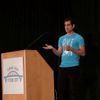Schedule
Wednesday, 17th May
An introduction to secure web development with Django and Python![]()
James Bennett
- James Bennett
Room 3
Wednesday, 17th May, 09:00 - 12:20
- Tutorials
Beginning Python Bootcamp![]()
Matt Harrison
- Matt Harrison
Room 1
Wednesday, 17th May, 09:00 - 12:20
- Tutorials
Contract-First API Development Using The OpenAPI Specification (Swagger)![]()

Dave Forgac, Ian Zelikman
![]()
- Dave Forgac, Ian Zelikman
Room 4
Wednesday, 17th May, 09:00 - 12:20
- Tutorials
Cross-platform Native GUI development with BeeWare![]()
Russell Keith-Magee
- Russell Keith-Magee
Room 5
Wednesday, 17th May, 09:00 - 12:20
- Tutorials
Exploratory data analysis in python![]()
![]()
Chloe Mawer, Jonathan Whitmore
- Chloe Mawer, Jonathan Whitmore
Room 7
Wednesday, 17th May, 09:00 - 12:20
- Tutorials
Fantastic Data and Where To Find Them: An introduction to APIs, RSS, and Scraping![]()
![]()
![]()
Nicole Donnelly, Tony Ojeda, Will Voorhees
- Nicole Donnelly, Tony Ojeda, Will Voorhees
Room 8
Wednesday, 17th May, 09:00 - 12:20
- Tutorials
Network Analysis Made Simple![]()
Eric J. Ma
- Eric J. Ma
Room 9
Wednesday, 17th May, 09:00 - 12:20
- Tutorials
Using Functional Programming for efficient Data Processing and Analysis![]()
Reuben Cummings
- Reuben Cummings
Room 6
Wednesday, 17th May, 09:00 - 12:20
- Tutorials
Web programming from the beginning![]()
Thomas Ballinger
- Thomas Ballinger
Room 2
Wednesday, 17th May, 09:00 - 12:20
- Tutorials
Python Language Summit![]()
![]()
Larry Hastings, Barry Warsaw
6 hours session
- Larry Hastings, Barry Warsaw
- 6 hours session
Keynotes venue
Wednesday, 17th May, 10:00 - 16:00
- Summit
Red Hat: Deploying Python web applications to OpenShift/Kubernetes![]()
Graham Dumpleton
- Graham Dumpleton
Room B110-111
Wednesday, 17th May, 11:00 - 12:30
- Sponsor tutorials
Twist Bioscience: Using Python in Synthetic DNA Manufacturing![]()
Kieran Hervold
- Kieran Hervold
Room B118-119
Wednesday, 17th May, 11:00 - 12:30
- Sponsor tutorials
Twist Bioscience: Using Python in Synthetic DNA Manufacturing![]()
![]()
![]()
![]()
![]()
Kelsey Hightower ( Google), Katy Huff ( University of Illinois), Jake Vanderplas ( University of Washington), Lisa Guo ( Instagram), Hui Ding ( Instagram)
- Kelsey Hightower ( Google), Katy Huff ( University of Illinois), Jake Vanderplas ( University of Washington), Lisa Guo ( Instagram), Hui Ding ( Instagram)
Keynotes venue
Wednesday, 17th May, 11:00 - 12:30
- Keynote
Decorators and descriptors decoded![]()
Luciano Ramalho
- Luciano Ramalho
Room 1
Wednesday, 17th May, 13:20 - 16:20
- Tutorials
bokeh: Data Visualization in Python![]()
Chalmer Lowe
- Chalmer Lowe
Room 8
Wednesday, 17th May, 13:20 - 16:40
- Tutorials
Complexity Science![]()
![]()
Allen Downey, Jason Woodard
- Allen Downey, Jason Woodard
Room 9
Wednesday, 17th May, 13:20 - 16:40
- Tutorials
ContainerOrchestration.py: The tutorial session![]()
![]()
![]()
Mike Bright, Haïkel Guémar, Mario Loriedo
- Mike Bright, Haïkel Guémar, Mario Loriedo
Room 5
Wednesday, 17th May, 13:20 - 16:40
- Tutorials
How to Write and Debug C Extension Modules![]()
Joe Jevnik
- Joe Jevnik
Room 3
Wednesday, 17th May, 13:20 - 16:40
- Tutorials
Introduction to Statistical Modeling with Python![]()
Christopher Fonnesbeck
- Christopher Fonnesbeck
Room 7
Wednesday, 17th May, 13:20 - 16:40
- Tutorials
Microservices with Python and Flask![]()
Miguel Grinberg
- Miguel Grinberg
Room 2
Wednesday, 17th May, 13:20 - 16:40
- Tutorials
Readable Regular Expressions![]()
Trey Hunner
- Trey Hunner
Room 4
Wednesday, 17th May, 13:20 - 16:40
- Tutorials
Time Series Analysis
Aileen Nielsen
![]()
- Aileen Nielsen
Room 6
Wednesday, 17th May, 13:20 - 16:40
- Tutorials
Clover Health: Transforming and Analyzing Healthcare Data with Python![]()
Bijan Vakili
- Bijan Vakili
Room B118-119
Wednesday, 17th May, 13:30 - 15:00
- Sponsor tutorials
Intel: Bring deep learning to the fingertips of data scientists with Python & BigDL on Apache Spark
Jiao Wang
![]()
- Jiao Wang
Room B110-111
Wednesday, 17th May, 13:30 - 15:00
- Sponsor tutorials
Intel: Scalable, distributed deep learning with Python and Pachyderm![]()
Daniel Whitenack
- Daniel Whitenack
Room B110-111
Wednesday, 17th May, 15:30 - 17:00
- Sponsor tutorials
Thursday, 18th May
Intel: Accelerating Python across the range of applications: the right tools for the job![]()
David Liu
- David Liu
Room B110-111
Thursday, 18th May, 09:00 - 10:30
- Sponsor tutorials
Build a data pipeline with Luigi![]()
Aaron Knight
- Aaron Knight
Room 9
Thursday, 18th May, 09:00 - 12:20
- Tutorials
Creating And Consuming Modern Web Services with Twisted![]()
![]()
Moshe Zadka, Michele Pratusevich
- Moshe Zadka, Michele Pratusevich
Room 5
Thursday, 18th May, 09:00 - 12:20
- Tutorials
Deploy and scale containers with Docker native, open source orchestration![]()
![]()
Jerome Petazzoni, AJ Bowen
- Jerome Petazzoni, AJ Bowen
Room 4
Thursday, 18th May, 09:00 - 12:20
- Tutorials
Faster Python Programs - Measure, don't Guess![]()
Mike Muller
- Mike Muller
Room 3
Thursday, 18th May, 09:00 - 12:20
- Tutorials
Hands-On Intro to Python for New Programmers![]()
Trey Hunner
- Trey Hunner
Room 1
Thursday, 18th May, 09:00 - 12:20
- Tutorials
Intro to Bayesian Machine Learning with PyMC3 and Edward![]()
![]()
Torsten Scholak, Diego Maniloff
- Torsten Scholak, Diego Maniloff
Room 6
Thursday, 18th May, 09:00 - 12:20
- Tutorials
IPython and Jupyter in Depth: High productivity, interactive Python![]()
![]()
![]()
Matthias Bussonnier, Mike Bright, Min Ragan-Kelley
- Matthias Bussonnier, Mike Bright, Min Ragan-Kelley
Room 7
Thursday, 18th May, 09:00 - 12:20
- Tutorials
Let's build a web framework!![]()
Jacob Kaplan-Moss
- Jacob Kaplan-Moss
Room 2
Thursday, 18th May, 09:00 - 12:20
- Tutorials
Mastering scipy.spatial![]()
Tyler Reddy
- Tyler Reddy
Room 8
Thursday, 18th May, 09:00 - 12:20
- Tutorials
Python Education Summit![]()
![]()
Al Sweigart, Luciano Ramalho
8 hours session
- Al Sweigart, Luciano Ramalho
- 8 hours session
Room A105-106
Thursday, 18th May, 09:00 - 17:00
- Summit
Anaconda: Data Science Apps with Anaconda![]()
Ian Stokes-Rees
- Ian Stokes-Rees
Room B118-119
Thursday, 18th May, 11:00 - 12:30
- Sponsor tutorials
Datadog: Distributed Tracing for Python![]()
Aaditya Talwai
- Aaditya Talwai
Room B110-111
Thursday, 18th May, 11:00 - 12:30
- Sponsor tutorials
Applied Modern Cryptography in Python![]()
Amirali Sanatinia
- Amirali Sanatinia
Room 9
Thursday, 18th May, 13:20 - 16:40
- Tutorials
Best Testing Practices for Data Science![]()
Eric J. Ma
- Eric J. Ma
Room 8
Thursday, 18th May, 13:20 - 16:40
- Tutorials
Django Admin: Basics and Beyond![]()
Kenneth Love
- Kenneth Love
Room 2
Thursday, 18th May, 13:20 - 16:40
- Tutorials
Effectively running python applications in Kubernetes/OpenShift![]()
Maciej Szulik
- Maciej Szulik
Room 4
Thursday, 18th May, 13:20 - 16:40
- Tutorials
Intermediate Python Bootcamp![]()
Matt Harrison
- Matt Harrison
Room 3
Thursday, 18th May, 13:20 - 16:40
- Tutorials
Introduction to Digital Signal Processing![]()
Allen Downey
- Allen Downey
Room 5
Thursday, 18th May, 13:20 - 16:40
- Tutorials
IoT Lab with Micropython and Friends![]()
Sev Leonard
- Sev Leonard
Room 6
Thursday, 18th May, 13:20 - 16:40
- Tutorials
Parallel Data Analysis![]()
![]()
![]()
Ben Zaitlen, Matthew Rocklin, Min Ragan-Kelley
- Ben Zaitlen, Matthew Rocklin, Min Ragan-Kelley
Room 7
Thursday, 18th May, 13:20 - 16:40
- Tutorials
Python Epiphanies![]()
Stuart Williams
- Stuart Williams
Room 1
Thursday, 18th May, 13:20 - 16:40
- Tutorials
Anaconda: Accelerating your Python Data Science code with Dask and Numba![]()
Ian Stokes-Rees
- Ian Stokes-Rees
Room B118-119
Thursday, 18th May, 13:30 - 15:00
- Sponsor tutorials
Elasticsearch and Python: Doing more with open source tools![]()
Honza Kral
- Honza Kral
Room B110-111
Thursday, 18th May, 15:30 - 17:00
- Sponsor tutorials
Google: How I Learned to Stop Worrying and Love Python at Google | Tech Talk Series![]()
Jasmine Hsu
- Jasmine Hsu
Room B110-111
Thursday, 18th May, 15:30 - 17:00
- Sponsor tutorials
Metis: Natural Language Processing and Text Mining in Python![]()
Michael Galvin
- Michael Galvin
Room B118-119
Thursday, 18th May, 15:30 - 17:00
- Sponsor tutorials
Friday, 19th May
Experiment Assignment on the Web![]()
Jessica Stringham
- Jessica Stringham
Oregon Ballroom 203–204
Friday, 19th May, 10:50 - 11:20
- Talks
In-Memory Event Resequencing: Realistic Testing For Impossible Bugs![]()
Michele Pratusevich
- Michele Pratusevich
Portland Ballroom 252-253
Friday, 19th May, 10:50 - 11:20
- Talks
Optimizations which made Python 3.6 faster than Python 3.5![]()
Victor Stinner
- Victor Stinner
Portland Ballroom 251 & 258
Friday, 19th May, 10:50 - 11:20
- Talks
Requests Under The Hood![]()
Cory Benfield
- Cory Benfield
Oregon Ballroom 201-202
Friday, 19th May, 10:50 - 11:20
- Talks
Title Available On Request: An Introduction to Lazy Evaluation![]()
Joe Jevnik
- Joe Jevnik
Portland Ballroom 254-255
Friday, 19th May, 10:50 - 11:20
- Talks
Big picture software testing: unit testing, Lean Startup, and everything in-between![]()
Itamar Turner-Trauring
- Itamar Turner-Trauring
Portland Ballroom 252–253
Friday, 19th May, 11:30 - 12:00
- Talks
Immutable Programming - Writing Functional Python![]()
Calen Pennington
- Calen Pennington
Portland Ballroom 254–255
Friday, 19th May, 11:30 - 12:00
- Talks
Passing Exceptions 101: Paradigms in Error Handling![]()
Amandine Lee
- Amandine Lee
Oregon Ballroom 201–202
Friday, 19th May, 11:30 - 12:00
- Talks
Prehistoric Patterns in Python![]()
Lennart Regebro
- Lennart Regebro
Portland Ballroom 251 & 258
Friday, 19th May, 11:30 - 12:00
- Talks
Type uWSGI; press enter; what happens?![]()
![]()
Asheesh Laroia, Philip James
- Asheesh Laroia, Philip James
Oregon Ballroom 203-204
Friday, 19th May, 11:30 - 12:00
- Talks
Next Level Testing![]()
James Saryerwinnie
- James Saryerwinnie
Portland Ballroom 251 & 258
Friday, 19th May, 12:10 - 12:40
- Talks
Web identity: OAuth2 and OpenIDConnect
Brendan McCollam
![]()
- Brendan McCollam
Oregon Ballroom 203-204
Friday, 19th May, 12:10 - 12:40
- Talks
Grok the GIL: Write Fast And Thread-Safe Python![]()
A. Jesse Jiryu Davis
- A. Jesse Jiryu Davis
Oregon Ballroom 201-202
Friday, 19th May, 12:10 - 12:55
- Talks
Introduction to Threat Modeling![]()
Ying Li
- Ying Li
Portland Ballroom 254–255
Friday, 19th May, 12:10 - 12:55
- Talks
The Gilectomy: How's It Going?![]()
Larry Hastings
- Larry Hastings
Portland Ballroom 251 & 258
Friday, 19th May, 12:10 - 12:55
- Talks
Implementing Concurrency and Parallelism From The Ground Up
Amber Brown
![]()
- Amber Brown
Oregon Ballroom 203-204
Friday, 19th May, 13:40 - 14:25
- Talks
Solid Snakes or: How to Take 5 Weeks of Vacation
Hynek Schlawack
![]()
- Hynek Schlawack
Portland Ballroom 252-253
Friday, 19th May, 13:40 - 14:25
- Talks
Community powered packaging: conda-forge
Filipe Pires Alvarenga Fernandes
![]()
- Filipe Pires Alvarenga Fernandes
Oregon Ballroom 201-202
Friday, 19th May, 13:55 - 14:25
- Talks
Dial M For Mentor![]()
Mariatta Wijaya
- Mariatta Wijaya
Portland Ballroom 254-255
Friday, 19th May, 13:55 - 14:25
- Talks
Packaging Let’s Encrypt: Lessons learned shipping Python code to hundreds of thousands of users![]()
Noah Swartz
- Noah Swartz
Portland Ballroom 251 & 258
Friday, 19th May, 13:55 - 14:25
- Talks
Dr. Microservices, Or How I Learned to Stop Worrying and Love the API![]()
Ryan Anguiano
- Ryan Anguiano
Portland Ballroom 252-253
Friday, 19th May, 14:35 - 15:05
- Talks
Factory Automation with Python - Stories about Robots, Serial Ports, and Barcode Readers![]()
Jonas Neubert
- Jonas Neubert
Oregon Ballroom 203-204
Friday, 19th May, 14:35 - 15:05
- Talks
Instagram Filters in 15 Lines of Python![]()
Michele Pratusevich
- Michele Pratusevich
Oregon Ballroom 201-202
Friday, 19th May, 14:35 - 15:05
- Talks
Rants and Ruminations From A Job Applicant After 💯 CS Job Interviews in Silicon Valley![]()
Susan Tan
- Susan Tan
Portland Ballroom 254-255
Friday, 19th May, 14:35 - 15:05
- Talks
Snek in the Browser![]()
Katie McLaughlin
- Katie McLaughlin
Room 3
Friday, 19th May, 14:35 - 15:05
- Talks
Python from Space: Analyzing Open Satellite Imagery Using the Python Ecosystem![]()
Katherine Scott
- Katherine Scott
Oregon Ballroom 201–202
Friday, 19th May, 15:15 - 14:00
- Talks
5 ways to deploy your Python web app in 2017![]()
Andrew T. Baker
- Andrew T. Baker
Portland Ballroom 252-253
Friday, 19th May, 15:15 - 15:45
- Talks
What's in your pip toolbox?![]()
Jon Banafato
- Jon Banafato
Oregon Ballroom 203-204
Friday, 19th May, 15:15 - 15:45
- Talks
Constructive Code Review![]()
Erik Rose
- Erik Rose
Portland Ballroom 254-255
Friday, 19th May, 15:15 - 16:00
- Talks
Ending Py2/Py3 compatibility in a user friendly manner![]()
![]()
Matthias Bussonnier, Min Ragan-Kelley
- Matthias Bussonnier, Min Ragan-Kelley
Portland Ballroom 251 & 258
Friday, 19th May, 15:15 - 16:00
- Talks
I Installed Python 3.6 on Windows and I Liked It![]()
Steve Dower
- Steve Dower
Portland Ballroom 251 & 258
Friday, 19th May, 15:15 - 16:00
- Talks
Dask: A Pythonic Distributed Data Science Framework![]()
Matthew Rocklin
- Matthew Rocklin
Portland Ballroom 252–253
Friday, 19th May, 16:15 - 17:00
- Talks
A gentle introduction to deep learning with TensorFlow![]()
Michelle Fullwood
- Michelle Fullwood
Oregon Ballroom 203-204
Friday, 19th May, 16:15 - 19:00
- Talks
Building A Gigaword Corpus: Lessons on Data Ingestion, Management, and Processing for NLP![]()
Rebecca Bilbro
- Rebecca Bilbro
Portland Ballroom 251 & 258
Friday, 19th May, 16:30 - 17:00
- Talks
Re-Programming the Human Genome with Python![]()
Riley Doyle
- Riley Doyle
Portland Ballroom 254-255
Friday, 19th May, 16:30 - 17:00
- Talks
The Glory of pdb's set_trace![]()
Nicole Zuckerman
- Nicole Zuckerman
Oregon Ballroom 201-202
Friday, 19th May, 16:30 - 17:00
- Talks
Algorithmic Music Generation![]()
Padmaja V Bhagwat
- Padmaja V Bhagwat
Portland Ballroom 251 & 258
Friday, 19th May, 17:10 - 17:40
- Talks
Looping Like a Pro in Python![]()
David DB Baumgold
- David DB Baumgold
Oregon Ballroom 201-202
Friday, 19th May, 17:10 - 17:40
- Talks
Snakes on a Hyperplane: Python Machine Learning in Production![]()
Jessica Lundin
- Jessica Lundin
Oregon Ballroom 203–204
Friday, 19th May, 17:10 - 17:40
- Talks
The Wild West of Data Wrangling![]()
Sarah Guido
- Sarah Guido
Portland Ballroom 254-255
Friday, 19th May, 17:10 - 17:40
- Talks
Leveraging Serverless Architecture for Powerful Data Pipelines![]()
Jason Myers
- Jason Myers
Portland Ballroom 252-253
Friday, 19th May, 17:40 - 17:40
- Talks
Saturday, 20th May
Automate AWS With Python![]()
Moshe Zadka
- Moshe Zadka
Portland Ballroom 252-253
Saturday, 20th May, 10:50 - 11:20
- Talks
Debugging in Python 3.6: Better, Faster, Stronger![]()
Elizaveta Shashkova
- Elizaveta Shashkova
Oregon Ballroom 201-202
Saturday, 20th May, 10:50 - 11:20
- Talks
It's time for datetime![]()
Mario Corchero
- Mario Corchero
Oregon Ballroom 203-204
Saturday, 20th May, 10:50 - 11:20
- Talks
The Memory Chronicles: A Tale of Two Pythons![]()
Kavya Joshi
- Kavya Joshi
Portland Ballroom 251 & 258
Saturday, 20th May, 10:50 - 11:20
- Talks
The trends in choosing licenses in Python ecosystem![]()
Anwesha Das
- Anwesha Das
Portland Ballroom 254-255
Saturday, 20th May, 10:50 - 11:20
- Talks
Awesome Command Line Tools![]()
Amjith Ramanujam
- Amjith Ramanujam
Portland Ballroom 252-253
Saturday, 20th May, 11:30 - 12:00
- Talks
How documentation works, and how to make it work for your project![]()
Daniele Procida
- Daniele Procida
Portland Ballroom 254-255
Saturday, 20th May, 11:30 - 12:00
- Talks
Readability Counts![]()
Trey Hunner
- Trey Hunner
Oregon Ballroom 201-202
Saturday, 20th May, 11:30 - 12:00
- Talks
Temporal Data Structures with SQLAlchemy and Postgres![]()
Joseph Leingang
- Joseph Leingang
Oregon Ballroom 203–204
Saturday, 20th May, 11:30 - 12:00
- Talks
When the abyss gazes back: staring down Python's surprising internals![]()
David Wolever
- David Wolever
Portland Ballroom 251 & 258
Saturday, 20th May, 11:30 - 12:00
- Talks
Exploring Network Programmability with Python and YANG![]()
Lisa N Roach
- Lisa N Roach
Portland Ballroom 252-253
Saturday, 20th May, 12:10 - 12:40
- Talks
What's new in Python 3.6![]()
Brett Cannon
- Brett Cannon
Oregon Ballroom 203-204
Saturday, 20th May, 12:10 - 12:40
- Talks
Level up! Rethinking the Web API framework.![]()
Tom Christie
- Tom Christie
Portland Ballroom 254-255
Saturday, 20th May, 12:10 - 12:55
- Talks
Modern Python Dictionaries -- A confluence of a dozen great ideas![]()
Raymond Hettinger
- Raymond Hettinger
Portland Ballroom 251 & 258
Saturday, 20th May, 12:10 - 12:55
- Talks
Static Types for Python![]()
Jukka Lehtosalo
- Jukka Lehtosalo
Oregon Ballroom 201-202
Saturday, 20th May, 12:10 - 12:55
- Talks
An Introduction to Reinforcement Learning
Jessica Forde
![]()
- Jessica Forde
Portland Ballroom 252-253
Saturday, 20th May, 13:40 - 14:25
- Talks
Text is More Complicated Than You Think: Comparing and Sorting Unicode![]()
Morgan Wahl
- Morgan Wahl
Oregon Ballroom 203-204
Saturday, 20th May, 13:40 - 14:25
- Talks
How to write a Python transpiler![]()
Russell Keith-Magee
- Russell Keith-Magee
Portland Ballroom 254-255
Saturday, 20th May, 13:55 - 14:25
- Talks
Know thy self: Methods and method binding![]()
Thomas Ballinger
- Thomas Ballinger
Oregon Ballroom 201–202
Saturday, 20th May, 13:55 - 14:25
- Talks
Magic Method, on the wall, who, now, is the `__fairest__` one of all?![]()
Sep Dehpour
- Sep Dehpour
Portland Ballroom 251 & 258
Saturday, 20th May, 13:55 - 14:25
- Talks
Decorators, unwrapped: How do they work?![]()
Katie Silverio
- Katie Silverio
Oregon Ballroom 201-202
Saturday, 20th May, 14:35 - 15:05
- Talks
Designing secure APIs with state machines![]()
Ashwini Oruganti
- Ashwini Oruganti
Portland Ballroom 251 & 258
Saturday, 20th May, 14:35 - 15:05
- Talks
How to make a good library API![]()
Flavio Juvenal
- Flavio Juvenal
Oregon Ballroom 203-204
Saturday, 20th May, 14:35 - 15:05
- Talks
Human-Machine Collaboration for Improved Analytical Processes![]()
Tony Ojeda
- Tony Ojeda
Portland Ballroom 252-253
Saturday, 20th May, 14:35 - 15:05
- Talks
The Fastest FizzBuzz in the West: Make Your Own Language with RPLY and RPython![]()
Dustin Ingram
- Dustin Ingram
Portland Ballroom 254–255
Saturday, 20th May, 14:35 - 15:05
- Talks
Library UX: Using abstraction towards friendlier APIs![]()
Mali Akmanalp
- Mali Akmanalp
Oregon Ballroom 203-204
Saturday, 20th May, 15:15 - 15:45
- Talks
Lights, camera, action! Scraping a great dataset to predict Oscar winners![]()
Deborah Hanus
- Deborah Hanus
Portland Ballroom 252-253
Saturday, 20th May, 15:15 - 15:45
- Talks
Executing python functions in the linux kernel by transpiling to bpf![]()
Alex Gartrell
- Alex Gartrell
Portland Ballroom 254-255
Saturday, 20th May, 15:15 - 16:00
- Talks
The Dictionary Even Mightier![]()
Brandon Rhodes
- Brandon Rhodes
Oregon Ballroom 201-202
Saturday, 20th May, 15:15 - 16:00
- Talks
No More Sad Pandas: Optimizing Pandas Code for Speed and Efficiency![]()
Sofia Heisler
- Sofia Heisler
Oregon Ballroom 201-202
Saturday, 20th May, 16:30 - 17:00
- Talks
Slot or not: higher performance custom objects in pure Python![]()
Aaron Hall
- Aaron Hall
Portland Ballroom 254-255
Saturday, 20th May, 16:30 - 17:00
- Talks
The Python Visualization Landscape![]()
Jake VanderPlas
- Jake VanderPlas
Portland Ballroom 252-253
Saturday, 20th May, 16:30 - 17:00
- Talks
Writing a C Python extension in 2017![]()
Jean-Baptiste Aviat
- Jean-Baptiste Aviat
Portland Ballroom 251 & 258
Saturday, 20th May, 16:30 - 17:00
- Talks
Yes, It's Time to Learn Regular Expressions![]()
Al Sweigart
- Al Sweigart
Oregon Ballroom 203-204
Saturday, 20th May, 16:30 - 17:00
- Talks
Cython as a Game Changer for Efficiency![]()
Alex Orlov
- Alex Orlov
Portland Ballroom 251 & 258
Saturday, 20th May, 17:10 - 17:40
- Talks
Fuzzy Search Algorithms: How and When to Use Them![]()
Eleanor Stribling
- Eleanor Stribling
Oregon Ballroom 203-204
Saturday, 20th May, 17:10 - 17:40
- Talks
Python for mathematical visualization: a four-dimensional case study![]()
David Dumas
- David Dumas
Portland Ballroom 252-253
Saturday, 20th May, 17:10 - 17:40
- Talks
Tracing, Fast and Slow: Digging into and improving your web service’s performance![]()
Lynn Root
- Lynn Root
Oregon Ballroom 201-202
Saturday, 20th May, 17:10 - 17:40
- Talks
Unicode: what is the big deal?![]()
Lukasz Langa
- Lukasz Langa
Portland Ballroom 254-255
Saturday, 20th May, 17:10 - 17:40
- Talks
Sunday, 21st May
async/await and asyncio in Python 3.6 and beyond![]()
Yury Selivanov
- Yury Selivanov
Oregon Ballroom 203-204
Sunday, 21st May, 13:10 - 13:40
- Talks
Hacking Classic Nintendo Games with Python![]()
Sam Agnew
- Sam Agnew
Portland Ballroom 252-253
Sunday, 21st May, 13:10 - 13:40
- Talks
Piecing it Together: A beginner's guide to application configuration![]()
Mary Nagle
- Mary Nagle
Probabilistic Programming with PyMC3![]()
Christopher Fonnesbeck
- Christopher Fonnesbeck
Portland Ballroom 251 & 258
Sunday, 21st May, 13:10 - 13:40
- Talks
Share Your Code! Python Packaging Without Complication![]()
Dave Forgac
- Dave Forgac
Oregon Ballroom 201-202
Sunday, 21st May, 13:10 - 13:40
- Talks
Asynchronous Python for the Complete Beginner![]()
Miguel Grinberg
- Miguel Grinberg
Oregon Ballroom 203-204
Sunday, 21st May, 13:50 - 14:20
- Talks
Look mum no hands! From blinking LEDs to a bike speedometer with MicroPython![]()
Kelsey Hightower ( Google)
- Kelsey Hightower ( Google)
Portland Ballroom 252-253
Sunday, 21st May, 13:50 - 14:20
- Talks
One Data Pipeline to Rule Them All![]()
Sam Kitajima-Kimbrel
- Sam Kitajima-Kimbrel
Oregon Ballroom 201-202
Sunday, 21st May, 13:50 - 14:20
- Talks
Python in The Serverless Era![]()
Benny Bauer
- Benny Bauer
Portland Ballroom 254-255
Sunday, 21st May, 13:50 - 14:20
- Talks
The Next Step: Finding Model Parameters With Random Walks![]()
Christine Waigl
- Christine Waigl
Portland Ballroom 251 & 258
Sunday, 21st May, 13:50 - 14:20
- Talks
aiosmtpd - A better asyncio based SMTP server![]()
Barry Warsaw
- Barry Warsaw
Oregon Ballroom 203-204
Sunday, 21st May, 14:30 - 15:00
- Talks
Bayesian Statistical Analysis with Python![]()
Eric J. Ma
- Eric J. Ma
Portland Ballroom 251 & 258
Sunday, 21st May, 14:30 - 15:00
- Talks
Building Stream Processing Applications
Amit Ramesh
![]()
- Amit Ramesh
Oregon Ballroom 201-202
Sunday, 21st May, 14:30 - 15:00
- Talks
Gothic Colors: Using Python to understand color in nineteenth-century literature![]()
Eleanor Stribling
- Eleanor Stribling
Portland Ballroom 254–255
Sunday, 21st May, 14:30 - 15:00
- Talks
Hacking Cars with Python![]()
Eric Evenchick
- Eric Evenchick
Portland Ballroom 252-253
Sunday, 21st May, 14:30 - 15:00
- Talks



































































































































